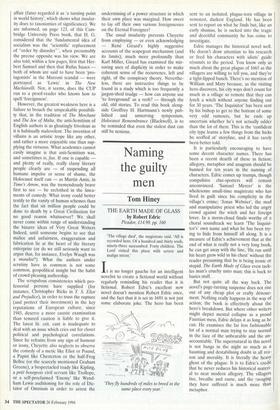Anti-Semitism can be fun
Frederic Raphael
CONSTRUCTIONS OF THE JEW' IN ENGLISH LITERATURE AND SOCIETY: RACIAL REPRESENTATIONS, 1875-1945 by Bryan Cheyette CUP, £35, pp. 240 If Mr Major had been less scrupulous (or, as Alan Clark might say, more efficient), he would never have announced a moral crisis without proposing a scape- goat whose extirpation would reverse the blight. By failing to supply an identifiable cause, the Prime Minister offered his Opponents the chance to point accusing fingers at him. Those who start Crusades must take care first to nominate their Saracens. Mrs Thatcher's providential `enemy within' was the Unions, to whose malign influence the Winter of Discontent and all subsequent misfortunes could be attributed. What comfort is a nanny with- out a bogey-man?
Until 1945 it had often been `the Jews' Who, in the eyes and on the lips of articu- late theorists and ranking intellectuals, had engineered or schemingly profited from the decline of major European powers whose mighty muscles were mysteriously useless against `a little white-faced Jew in a bathchair with an eye just like a rattlesnake' (hats off to John Buchan, Lord Tweedsmuir). It is, of course, to the moral credit of Mr Major that he refrains from recourse to a routine of unreason which served Christendom so well for so long, but it can also be argued (or at least hoped) that anti-Semitism, though still the `suburban prejudice' which Ezra Pound Pretended — very belatedly — to regret, no longer serves as a convincing remedy for `decline'. A Jew may still be vilified (and sometimes, like Robert Maxwell, be vile) but `the Jews', as a sort of abstract entity, are no longer a plausible target for para- noid delusions, except on the part of even greater crackpots than Hilaire Belloc. This unreliable redemption owes less to the recognition of Jewish virtues (or the exis- tence of Israel) than to the fact that no Plausibly fiendish conspirators, however well-oiled their bathchairs, could have schemed to procure for themselves the fate of the Jews in the present century.
If more or less virulent 'social' anti- Semitism is not unknown today, the full-
blown Socialism of Fools — as a political theory of the kind variously endorsed by H. G. Wells, Bernard Shaw, the Chester- Belloc fraternity, D. H. Lawrence and Wyndham Lewis, not to mention the saint- ed Virginia Woolf and her acolytes — is no longer respectable. Cheapness and nasti- ness splutter on in Philip Larkin and Richard Ingrams and their epigoni, and they find a mutation in the anti-Israelism of pin-striped poseurs like Gore Vidal, but as a lightning conductor, anti-Semitism has lost its salutary powers and hence its pied- piping charm.
Ignoring instructive, non-canonical instances such as Maugham's The Alien Corn, Bryan Cheyette has trotted out the usual moribund texts for his analysis of the pathology of `the Jew' as depicted in English literature from 1875 until 1945, when the threadbare mechanism — and murderous consequences — of scape- goatery became disenchantingly clear even to the cleverest minds. However, one of the putatively finest of them, T. S. Eliot, saw no prompt need to revise his philosophy or apologise for a spite which, we are promised by close-to-the-throne mem- oirists, he never displayed towards 'individual Jews' (a testimony more to his cowardice than to his morals). His reputa- tion remains largely untarnished; `money in furs' is one thing, but when did money from Cats do anybody any harm? Despite the moment of Belsen, when unmitigated reality shredded the Modernists' mediating fabric of literary perversity, the Eng. Lit. establishment has managed pretty well to patch the reputations of the idols to whom their critical ascendancy is committed. Only an occasional twitch of published dismay at the 'authoritarian' philosophies of certain enshrined authors suggests that a few academics have seen that something just may be wrong with traditional reverences. Such fawning quibbles can — if suitably processed and rigged, like Dr Cheyette's, with an apparatus criticus — be retailed to the university libraries where Pound and Eliot and other putative `thinkers' continue to be importantly curricular.
Is it their fault, it is sometimes asked, if `our' best writers have repeatedly been interpreted as having authorised genocide? (Briefly: if justly, yes.) It does not, in truth, require much coercive interpretation to see that T. S. Eliot could play the modern- dress version of Henry II in Murder in the Cathedral to a fare-thee-well and that `Will no one rid me, etc?' was a speech that came easily to him. As for G. B. S., his amusing playfulness endorsed the right of a state to practise `civilised' eugenics, by which, perhaps, he meant gas not the axe. H. G. Wells, the apostle of science, shared Chesterton's grave view of the Marconi
affair (fatso regarded it as 'a turning point in world history', which shows what insular- ity does to taxonomies of significance). We are informed, on page 123, of this Cam- bridge University Press book, that H. G. considered that the 'fundamental idea of socialism was the "scientific' replacement of "order by disorder" ', when presumably the precise opposite was his view. We are also told, within a few pages, first that Her- bert Samuel and then that Rufus Isaacs — both of whom are said to have been 'pro- tagonists' in the Marconi scandal — were portrayed as 'Lewis' in The New Machiavelli. Nor, it seems, does the CUP run to a proof-reader who knows how to spell 'foreignness'.
However, the greatest weakness here is a failure to broach the unspeakable possibili- ty that, in the tradition of The Merchant and The Jew of Malta, the anti-Semitism of English authors is as gloatingly frivolous as it is habitually malevolent. The invention of villains is an artistic trope like any other, and rather a more enjoyable one than sup- plying the virtuous. What academics cannot easily imagine is that anti-Semitism was, and sometimes is, fun. If one is capable — and plenty of really, really classy literary people clearly are — of suspending all humane impulse or sense of shame, the Holocaust itself can — as Martin Amis, in Time's Arrow, was the tremendously brave first to see — be reclothed in the linea- ments of comedy. What irony could better testify to the vanity of human schemes than the fact that six million people could be done to death by a Great Civilisation for no good reason whatsoever? We shall never come within range of understanding the bizarre ideas of Very Great Writers Indeed, until someone begins to see that malice and unfairness, exaggeration and fabrication lie at the heart of the literary enterprise (or do we still seriously want to argue that, for instance, Evelyn Waugh was a moralist?). What the authors under scrutiny have in common is not some common, geopolitical insight but the habit of crowd-pleasing authorship.
The scrupulous consistencies which pro- fessorial persons have supplied (for instance, Christopher Ricks in T. S. Eliot ,and Prejudice), in order to truss the rupture (and protect their investment) in the key reputations of European culture, since 1945, deserve a more caustic examination than tenured caution is liable to give it. The latest lit. crit. cant is inadequate to deal with an issue which cries out for closer political and psychological correlations. Since he refrains from any sign of humour or irony, Cheyette also neglects to observe the comedy of a metic like Eliot or Pound, a Papist like Chesterton or the half-Frog Belloc (or the scarcely mentioned Graham Greene), a bespectacled toady like Kipling, a petit bourgeois civil servant like Trollope, or a self-proclaimed 'Enemy' like Wynd- ham Lewis auditioning for the role of Dic- tator of Omnium in order to arrest the undermining of a power structure in which their own place was marginal. How sweet to lay off their own various foreignnesses on the Eternal Foreigner!
The usual insularity prevents Cheyette from employing — or even acknowledging — Rene Girard's highly suggestive accounts of the scapegoat mechanism (and its limits); much more profoundly than Karl Miller, Girard has examined the mir- roring uses of duplicity in order to make coherent sense of the recurrence, left and right, of the conspiracy theory. Neverthe- less, there are instructive things to be found in a study which is too frequently a jargon-shod trudge — how can anyone use 'to foreground' as a verb? — through the old, old stories. To read this book along- side Geoffrey H. Hartmann's newly pub- lished and unnerving symposium, Holocaust Remembrance (Blackwell), is to be reminded that even the stalest dust can still be noxious.



























































 Previous page
Previous page